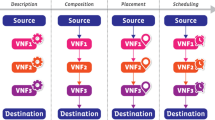
Overview
- Discusses major resource allocation problems in NFV
- Presents the key concepts and dynamics of this technology for network engineers, architects, and students
- Provides vital technical and theoretical insights into SDN and NFV
Access this book
Tax calculation will be finalised at checkout
Other ways to access
About this book
Network Function Virtualization (NFV) has recently attracted considerable attention from both research and industrial communities. Numerous papers have been published regarding solving the resource- allocation problems in NFV, from various perspectives, considering different constraints, and adopting a range of techniques. However, it is difficult to get a clear impression of how to understand and classify different kinds of resource allocation problems in NFV and how to design solutions to solve these problems efficiently.
This book addresses these concerns by offering a comprehensive overview and explanation of different resource allocation problems in NFV and presenting efficient solutions to solve them. It covers resource allocation problems in NFV, including an introduction to NFV and QoS parameters modelling as well as related problem definition, formulation and the respective state-of-the-art algorithms.This book allows readers to gain a comprehensive understanding of and deep insights into the resource allocation problems in NFV. It does so by exploring (1) the working principle and architecture of NFV, (2) how to model the Quality of Service (QoS) parameters in NFV services, (3) definition, formulation and analysis of different kinds of resource allocation problems in various NFV scenarios, (4) solutions for solving the resource allocation problem in NFV, and (5) possible future work in the respective area.
Similar content being viewed by others
Keywords
Table of contents (7 chapters)
-
Front Matter
Authors and Affiliations
About the authors
Song Yang received the B.S. degree in software engineering and the M.S. degree in computer science from Dalian University of Technology, China, in 2008 and 2010, respectively, and the Ph.D. degree from Delft University of Technology, The Netherlands, in 2015. From August 2015 to August 2017, he worked as postdoc researcher for the EU FP7 Marie Curie Actions CleanSky Project in Gesellschaft fur wissenschaftliche Datenverarbeitung mbH Goettingen (GWDG), Goettingen, Germany. He is currently an associate professor at School of Computer Science and Technology in Beijing Institute of Technology, China. His research interests focus data communication networks, cloud/edge computing and network function virtualization.
Nan He received her B.E. degree in Computer and Information from Hefei University of Technology, China in 2016 and received her M.S. degree from Jilin University, China in 2019. Currently she is a Ph.D. student in the School of Computer Scienceand Technology, Beijing Institute of Technology. Her research interests include network function virtualization and network resource optimization management based on reinforcement learning.
Fan Li received the PhD degree in computer science from the University of North Carolina at Charlotte in 2008, MEng degree in electrical engineering from the University of Delaware in 2004, MEng and BEng degrees in communications and information system from Huazhong University of Science and Technology, China in 2001 and 1998, respectively. She is currently a professor at School of Computer Science and Technology in Beijing Institute of Technology, China. Her current research focuses on wireless networks, ad hoc and sensor networks, and mobile computing.
Xiaoming Fu received his Ph.D. in computer science from Tsinghua University, Beijing, China in 2000. He was then a research staff at the Technical University Berlin until joining the University of Goettingen, Germany in 2002, where he has been a professor in computer science and heading the Computer Networks Group since 2007. Prof. Fu's research interests include network architectures, protocols, and applications. He is currently an editorial board member of IEEE Network, IEEE Transactions on Network and Service Management, and has served on the organization or program committees of leading conferences such as INFOCOM, ICNP, ICDCS, MOBICOM, MOBIHOC, CoNEXT, ICN and COSN. He is an IEEE Fellow, an ACM Distinguished Member, a fellow of IET and member of the Academia Europaea.
Bibliographic Information
Book Title: Resource Allocation in Network Function Virtualization
Book Subtitle: Problems, Models and Algorithms
Authors: Song Yang, Nan He, Fan Li, Xiaoming Fu
DOI: https://doi.org/10.1007/978-981-19-4815-2
Publisher: Springer Singapore
eBook Packages: Engineering, Engineering (R0)
Copyright Information: The Editor(s) (if applicable) and The Author(s), under exclusive license to Springer Nature Singapore Pte Ltd. 2023
Hardcover ISBN: 978-981-19-4814-5Published: 30 August 2022
Softcover ISBN: 978-981-19-4817-6Published: 31 August 2023
eBook ISBN: 978-981-19-4815-2Published: 29 August 2022
Edition Number: 1
Number of Pages: XII, 135
Number of Illustrations: 54 b/w illustrations
Topics: Communications Engineering, Networks, Graph Theory, Operations Research, Management Science, Theory of Computation, Algorithm Analysis and Problem Complexity



